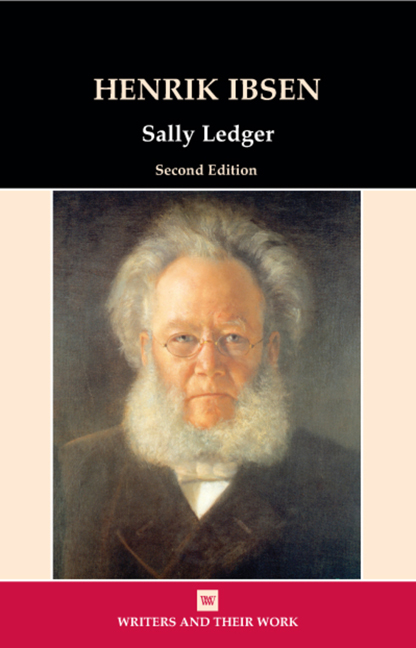Book contents
- Frontmatter
- Dedication
- Contents
- Acknowledgements
- Biographical Outline
- Note on Translations
- Abbreviations
- 1 Ibsenism and A Doll's House
- 2 Ibsen, Realism and ‘Modern’ Drama: From Norwegian Nationalism to Ghosts
- 3 Liberalism and its Discontents: Ibsen's Politics in An Enemy of the People
- 4 Ibsen's Women: The Lady from the Sea, Hedda Gabler and Little Eyolf
- 5 Ibsen, Freud and Psychological Drama: Rosmersholm and Peer Gynt
- 6 Beyond Realism: John Gabriel Borkman and When We Dead Awaken
- 7 Afterword: Ibsen Now
- Notes
- Select Bibliography
- Index
- Recent and Forthcoming Titles in the New Series of WRITERS AND THEIR WORK
7 - Afterword: Ibsen Now
- Frontmatter
- Dedication
- Contents
- Acknowledgements
- Biographical Outline
- Note on Translations
- Abbreviations
- 1 Ibsenism and A Doll's House
- 2 Ibsen, Realism and ‘Modern’ Drama: From Norwegian Nationalism to Ghosts
- 3 Liberalism and its Discontents: Ibsen's Politics in An Enemy of the People
- 4 Ibsen's Women: The Lady from the Sea, Hedda Gabler and Little Eyolf
- 5 Ibsen, Freud and Psychological Drama: Rosmersholm and Peer Gynt
- 6 Beyond Realism: John Gabriel Borkman and When We Dead Awaken
- 7 Afterword: Ibsen Now
- Notes
- Select Bibliography
- Index
- Recent and Forthcoming Titles in the New Series of WRITERS AND THEIR WORK
Summary
One hundred years after Ibsen's death, his plays remain as popular in Britain as when they first arrived on the London stage in 1889. He is, too, the most frequently televised dramatist after Shakespeare. Both the realism of Ibsen's middle drama – the stifling drawing-room settings of A Doll's House, Ghosts and Hedda Gabler – and the more existential modernity of the late plays such as John Gabriel Borkman and When We Dead Awaken, continue to appeal to twenty-first century theatre audiences accustomed equally to theatrical naturalism and to modernist experimentation. That Ibsen's dramatic realism retained its power at the end of the 1990s was amply demonstrated by London's Playhouse 1997 production of A Doll's House, starring Janet McTeer. The ‘prop-rich’ conventions of the nineteenth-century stage, along with Ibsen's detailed and painstaking mise en scène, were faithfully reproduced – there was nothing remotely avant-gardist about the production. And yet the tension in the theatre was palpable, with a significant proportion of the audience visibly moved by the final dialogue between Nora and Torvald Helmer in which the wreckage of their marriage is surveyed with a quiet agony. Into the twenty-first century the Greenwich Playhouse's production of A Doll's House (December 2004–January 2005) was equally faithful in its naturalistic recreation of the late-nineteenth century bourgeois household, with its delicately decorated Christmas tree and close attention to costume detail. Alice Grace's stunning performance as a beautifully complex Nora, whose fragility and seeming subservience only thinly veil her exceptional strength and moral fibre, was complemented by Martin Beere's moving rendition of Dr Rank's hopeless love for the unhappy young wife.
The intense theatricality inherent in Ibsen's plays is the source of their continued vigour and variety in production. The ascendancy of the modernist aesthetic in the early-twentieth century, which continued to influence late-twentieth century theatre, has meant that avant-gardist directors have sometimes tried to re-invent Ibsen's realism along modernist lines, emphasizing the psychological and existential dimensions of his work rather than the social and material relationships through which wider human issues are explored in the plays. One example of a number of such productions was Ingmar Bergman's 1964 production of Hedda Gabler in the Royal Dramatic Theatre in Stockholm.
- Type
- Chapter
- Information
- Henrik Ibsen , pp. 65 - 67Publisher: Liverpool University PressPrint publication year: 2008



